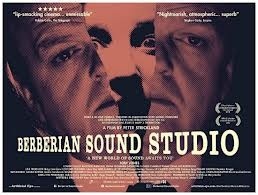This review contains plot spoilers.
I’ve been pondering how to review this film for nearly a week now and I’m still not really any closer to knowing what to say. Let’s get the most important things out of the way first: Berberian Sound Studio is a very good film, but it is not a film that will be for everyone. So what’s it about?
The always excellent Toby Jones plays Gilderoy, a brilliant British sound engineer who has been flown to Italy to work on a Giallo film (the movie is set in the 70s). It quickly becomes clear that Gilderoy isn’t aware of the nature of Giallo films and is rather upset by the subject matter upon which he is working. Slowly the literally foreign culture and figuratively foreign subject matter get to him and he (and we) are slowly disorientated and begin to question what is reality.
The film is disorientating from the start, putting us into Gilderoy’s shoes and offering as little explanation for the situation as possible. We never see the film Gilderoy is working on, but it is made to seem uncomfortably graphic through a combination of the sound effects created by the foley artists and the descriptions of sequences from the producer, director and actors.
Given that writers and directors of film are normally told they must show, not tell, in their stories, it’s remarkably how little is shown, the emotions of the piece almost entirely playing out on Toby Jones’ face. We are drawn in to his world and to empathise with the frustration and disgust he feels at working on the project, and rather than resolving, it devolves into a form of madness, the explanation we crave as an audience isn’t given just as Gilderoy seems unable to end his nightmare.
Berberian Sound Studio isn’t a perfect film, but it is bloody good. While short (clocking in at 92 minutes), it perhaps takes a little too long to begin to unravel, but that is to fault a film which does some things that I’ve not seen in a film before. It is expertly crafted by director Peter Strickland and is an incredibly atmospheric watch.

